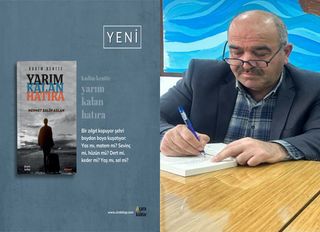Tevazu ve Sömürü
Tevazu büyük bir insani erdemdir. Süryani kültüründe tevazu ile ‘‘insanlığa hizmet eden Allah’a en yakın olandır’’ mantığı var.
Fakat öteden beri medeniyetin mümbit kaynağı olan coğrafyamızda farklı toplumsal kesimlerde özünü bulamamış düşünce, zaman zaman tevazuu hor gördüğü, olumsuz değerlendirdiği ve bir sömürü aracı olarak kullandığı görülmektedir.
Tevazu timsali ve aynı zamanda Süryani kültüründe ve edebiyatında evrensel üne sahip bir otorite olan Nusaybinli Aziz Mor Afrem (303-373), sağmal inek zihniyetinin zemin bulduğu yerlerde/insanlarda, tevazuun yanlış değerlendirildiğini yaşayarak deneyimlemişti.
Onun için ‘‘ܐܢܗܘ ܕܐܬܡܰܟܟܬ ܚܰܫܒܘܼܟ ܕܠܐ ܚܰܘܪܐ enhu dethmakkakht, haşbukh dlo havro / mütevazı davrandığında, seni basiretsiz sanırlar’’ şeklinde uyarıda bulunmuştur.
14. yüzyıl düşünürlerinden İbni Haldun (1332-1406) da tevazuun suiistimaline karşı şöyle bir uyarıda bulunmaktadır: ‘‘Fazla tevazuun sonu vasat insandan nasihat dinlemektir.’’
Oysa yaşamın hakikatinde tevazu esastır. Tevazu bizi dünyaya açar.
‘‘Topraktan yaratılan insan, toprak gibi tevazu sahibi olmazsa, aslından/insanlığından çıkmış olur’’ sözü, tevazu konusunda hatırlanması gereken en uygun sözdür.
İstismara-sömürüye kapalı bir tevazu mantığıyla davranmak ve zarardan veyahut zarar verici şeylerden kaçmak aslında bir sevgi eylemidir. Kendimize duyduğumuz sevgidir.
Tevazu, kişiliğimizi ruhumuzla hizalayan güçtür. Buna özgün güç de denilir. Tevazu, bir idrak biçimidir. ‘Sen’i duymak için ‘ben’i susturmak. Ben’i haddinde tutmaktır.
Tevazu kendi değerimizi azaltmak değil, başka insanlara değer vermektir. Tevazu, benliğimizi aradan çıkararak, bütün varlığa gönül kapılarını açmaktır. Üstünlük taslamamak, insanın kendisini diğer insanlara ve hatta yaratılmışlara denk bilmesidir. İnsanın kendi benliğini yerli yerine koymasıdır. Benlik davası gütmemesidir. Kâinatı saran o eşsiz ilahi fısıltıyı duymak ve benliğini geri çekmesidir.
Bir bilgenin dediği gibi, ‘‘Nasıl karanlık ışığı açığa çıkarırsa, tevazu da kişide cennet ışıklarını aşikâr eder.’’
Mütevazı kişi hayattan, diğer insanlardan, bütün bir kâinattan ilham alır ve gücü yettiğince başkalarına ilham verir. Mütevazı ruh nezaket ve merhametle karılmıştır. İnsanlara hizmet onun için onur meselesidir.
التواضع والاستغلال
يوسف بكتاش
إنّ التواضعَ فضيلةٌ إنسانية عظيمة؛ وفي الثقافة السريانية منطق بصدده: الشخص الذي يخدُم بني البشر بتواضع يكون الأقربَ من الله. هذه الفكرة، لم تحظَ بمكانة في أوساط شتّى شرائح مجتمعنا، وجغرافية هذا المجتمع بمثابة مصدر خصب ودائم للحضارة، وتلك الفكرة، تحتقر التواضع وتستخدمه أحيانًا وسيلةً للاستغلال.
يُعتبر القِدّيس مار أفرام النصّيبيني/السرياني (٣٠٣-٣٧٣م.) نموذجًا يُحتذى به للتواضع، وفي الوقت ذاته، مرجعية عالمية في كلّ من الثقافة والأدب السريانيين. وقد توصّل من خلال تجربته الحياتية، إلي حقيقة مفادها أنّه في الأماكن والمجتمعات، التي يتبنّى الناس فيها عقليّةَ البقرة الح (ܐܢܗܘ ܕܐܬܡܰܟܰܟܬ ܚܰܫܒܘܼܟ ܕܠܐ ܚܰܘܪܐ) أي: إنْ تواضعت اعتقدوا أنّك بلا عقل.
كما حذّر مفكّر القرن الرابع عشر، ابن خلدون (١٣٣٢-١٤٠٦ م.) من استغلال التواضع قائلًا: نتيجة التواضع المُفْرط تجعلك في آخر المطاف تُصغي لمشورة بعض الأشخاص العاديين. إلّا أنّ التواضع، في الواقع، أساسُ الحياة الحقيقية فهو يكشف لنا العالَم. القول الأكثر ملائمة عن مفهوم التواضع الذي نحتاج لتذكّره هو: إنّ الإنسان المخلوق من التراب وغير المتواضع كالتراب، يكون في الواقع قدِ ٱنفصل عن أصله وعن إنسانيته.
إنّ التصرّف وَفق منطق التواضع، بدون الإساءة والاستغلال، تجنُّب الضرر وتجنّب الأمور التي تؤدّي إليه، هو في الواقع عمل محبّة؛ إنّها المحبّة التي نشعر بها تجاهَ أنفسنا.
التواضع هو القوّة التي بها تنتظم شخصيّتنا مع روحنا؛ ومن الممكن تسمية هذه القوّة بالحقيقية، الأصيلة. التواضع هو تصوّر ذهني ”لكي أُصْغي إليك عليَّ أنْ أُسكتَ الأنا في داخلي، أي تحجيم الأنا ووضعها في نطاق حدودها“.
التواضع لا يعني تقليصَ أو انتقاص قيمتنا، بل إنّه إعطاءُ قيمة للآخرين. والتواضع يعني أيضًا أن نفتح قلوبَنا للخليقة جمعاء بإزالة الغرور من الطريق. التواضع لا يعني التظاهر بالفوقية، لكنّه بالأحرى معرفة نقيض التوازن بين الذات والآخرين، حتّى بين الذات والمخلوقات الأُخرى. إنّ التواضع سمةُ الشخص الذي يضع الذات في المكان الصحيح. وهذه الخاصية ليست مسألة تتبع الذات بل الإصغاء إلى الهمس الإلهي الذي لا يُضاهى والمحتضن للكوْن، وأن تراجع ذاتَك.
كما قال أحد الحكماء ”كما يُظهر الظلامُ النورَ، كذلك يكشف التواضع أنوارَ الفردوس الكامنة في الإنسان“. يحظى الإنسان المتواضع بالإلهام من الحياة، من الآخرين ومن العالَم برمّته؛ وحينما يُصبح متمكّنًا يكون ملهمًا للآخرين. إنّ الروحَ المتواضعة، تنقل ذاتَها إلى مقاليد حُسن التصرّف والرحمة. وعليه فإنّ خدمةَ البشرية تُعدّ قضية شرف بالنسبة لذلك الشخص.
ترجمة من الإنچليزية إلى العربية:
د. إشراق نبعة والسيّد أسد خليل
تدقيق لغوي: أ. د. حسيب شحادة
Humility and Exploitation
Humility is a great human virtue. Syriac culture has a logic to it: the one who serves human beings/humanity, with humility, is the one who is most near to God.
A thought which has not found its essence, among various social sectors in our geography -ever always a fertile source of civilization- which despizes humility, negatively evaluates it, and uses it as a tool for exploitation, from time to time, appears. Saint Apfrem of Nisibis (303-373), both an exemplar of humility and at the same time a universal authority in Syriac culture and literature, tested by his life-experience the fact that in places and communities where people take on the mentality of the milk cow, they have wrong ideas about humility.
And so he warns us: ‘ ܐܢܗܘ ܕܐܬܡܟܟܬ ܚܫܒܘܼܟ ܕܠܐ ܚܰܘܪܐ enhu dethmakkakht, haşbukh dlo havro / when you behave humbly, they think you are imprudent.”
The fourteenth century thinker Ibn Khaldun (1332-1406) also warns against the exploitation of humility in this manner: “The outcome of too much humility is that you end up listening to the counsel of some mediocre individual.”
But actually humility is fundamental to a true life. Humility opens up the world to us.
The most appropriate saying we need to remember about humility, is: “If man, who was made from the dust of the ground, is not humble like the dust, he has actually departed from his origin/from his humanity.”
To behave with the logic of humility, excluding abuse and exploitation, fleeing from damage and things that do damage, is truly an act of love. It is the love we feel toward ourselves.
Humility is the power that lines up our personality with our spirit. We can call this genuine power. Humility is a form of perception. “To hear you, is to silence the ‘I’ in me. It is to keep the ‘I’ within limits.”
Humility is not to reduce our own value, it is to give value to others. Humility is to open the doors of our heart to all existence, by taking our ego out of the way. It is not to pretend to be superior, but rather to know the counter-poise between self and other people, and even between self and other creatures. It is the quality of a person who puts the self in just the right place. It is to not pursue the case for the self. It is to listen to the incomparable divine whisper that embraces the universe and to pull the self back.
As a wise man said: ‘‘Just as the darkness makes the light to stand out, so also humility makes the lights of paradise within the person, clear.’’
The humble person recieves inspiration from life, from other people, from all the universe, and when he/she is able, inspires others. The humble spirit transposes itself into the keyes of good manners and mercy. For this reason to serve human beings is a matter of honor (for him).
Yusuf Beğtaş






















